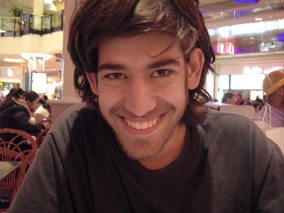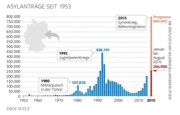
|
Germany is welcoming a wave (estimate: 800.000 refugees in 2015, more than 1 million in 2014 as well as in 2015) of asylum seeking (wo)men and children, recently mostly from Syria (statistics 2015). Many children have been arriving on their own, unaccompanied (Petition for help, video by SOS-Kinderdörfer, details). We made us familiar with some literature dealing with the issue of long term integration - a rather meagre attitude compared to what friends of ours do here. Applications For Asylum in 1953-2015 |
 Source: The Internet's Own Boy: the Story of Aaron Swartz |
In connection with the revelations by Edward Snowden we decided to become members of the German NGO "netztpolitik.org early 2015 and have kept us informed (e.g. annual report in German) about the issues
|
Basis:
- Scientific Counsel on Global Environmental Change (WBGU):
Limiting the anthropogenic global temperature rise to 2° C is equivalent to a total CO2 budget all of humanity may release into the atmosphere. The part of this budget still available to mankind from today on is smaller than 800 Gt CO2. A just distribution of these less than 800 Gt needs to take into account how much each country has already emitted. Germany as well as the USA have already used up their share. We need to buy CO2 certificates for our entire economic activity, e.g. for the 10 tons of CO2 the average German releases annually into the atmosphere he needs to contribute up to 10 x 100 $ per year to the carbon reduction fund. - US Deep Decarbonization Pathways Project:
"This study does not find any major technical or economic barriers to maintaining the U.S. long-term commitment to reducing greenhouse gas (GHG) emissions consistent with limiting global warming to less than 2° C. In terms of technical feasibility and cost, this study finds no evidence to suggest that relaxing the 80% [reduction] by 2050 emissions target or abandoning the 2° C limit is justified. In addition, the 2° C goal plays a critical role as a guide for near-term mitigation efforts, providing a benchmark for the necessary scale and speed of infrastructure change, technical innovation, and coordination across sectors that must be achieved in order to stay on an efficient path to climate stabilization.Energy system changes on the scale described in this analysis imply significant opportunities for technology innovation and investment in all areas of the U.S. energy economy. Establishing regulatory and market institutions that can support this innovation and investment is critical. Both areas - technology innovation and institutional development - are U.S. strengths, and place the U.S. in a strong leadership and competitive position in a low carbon world."
- German Deep Decarbonization Pathways Project:
"This report aims to show that although there are challenges to be overcome on the way to a fundamental transformation, deep decarbonization can be achieved in Germany by 2050. As a result of about 30 years of critical engagement with climate and energy policies in Germany, a huge amount of theoretical and practical knowledge on transformation processes has been gathered. This knowledge should be used and also expanded in order to properly deal with the challenges associated with the complex process of achieving deep decarbonization.In order to achieve deep decarbonization and related co-benefits in Germany, the real challenge consists not so much of developing but of actually implementing decarbonization strategies. Therefore, authorities at different political levels need to introduce appropriate policies supporting the implementation of measures linked to the long-term mitigation strategies. As transformation processes are subject to constraints, uncertainties and path dependencies, these challenges need to be identified and addressed at an early stage. Concrete policy challenges linked to deep decarbonization in Germany exist for all of the three key strategies mentioned above."
